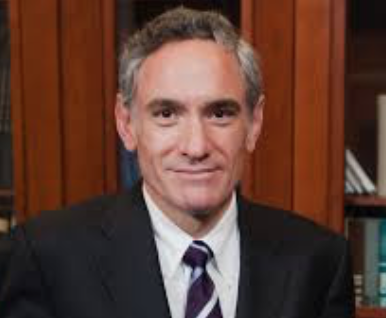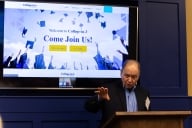You have /5 articles left.
Sign up for a free account or log in.

Scott Atlas
Stanford University
In an unusual move for an academic, Dr. Scott Atlas, Robert Wesson Senior Fellow at Stanford University's Hoover Institution, is threatening to sue Stanford colleagues who criticized his work. The work in question here is also unusual, as Atlas has since August served as an adviser on the White House coronavirus task force.
Atlas, a neuroradiologist and health-care policy expert, was immediately a controversial pick for the White House post, as he is not an immunologist, epidemiologist or public health expert. And some of his public statements before and after joining the task force have been controversial, as well.
In July, for instance, prior to his appointment, Atlas told Fox News, “These people getting the infection is not really a problem, and in fact, as we said months ago, when you isolate everyone, including all the healthy people, you're prolonging the problem because you’re preventing population immunity.” Atlas later denied that he was advocating a herd-immunity approach to the virus, but he has made other statements that challenge what experts say about COVID-19, such as "children almost never transmit the disease," that asymptomatic people shouldn't necessarily be tested, and that the "data is unclear on masks." Most of the studies on masks, he told radio host Brian Kilmeade, are "deeply flawed" and even "garbage."
Troubled by their colleague’s influence on the national response to the coronavirus -- which was and continues to be troubling -- a group of 98 Stanford immunologists this month published an open letter about Atlas.
Citing the Hippocratic oath’s “first, do no harm,” the signers said they have “both a moral and an ethical responsibility to call attention to the falsehoods and misrepresentations of science recently fostered” by Atlas.
Many of Atlas’s comments and opinions “run counter to established science and, by doing so, undermine public-health authorities and the credible science that guides effective public health policy,” the medical professors continued. The “preponderance of data” supports mitigation strategies such as wearing masks and indicates that both children and asymptomatic adults transmit COVID-19 and testing them can help break the chain of infection, the open letter says. On herd immunity, they wrote, the “safest path” is through “deployment of rigorously evaluated, effective vaccines that have been approved by regulatory agencies.”
Atlas has advocated reopening schools and businesses, and his Stanford colleagues wrote that all that can happen -- “if we follow policies that are consistent with science.”
“As Stanford faculty with expertise in infectious diseases, epidemiology and health policy, our signatures support this statement with the hope that our voices affirm scientific, medical and public health approaches that promote the safety of our communities and nation,” the letter states.
In response, Atlas’s attorney, Marc Kasowitz, wrote to the 90-some signers, demanding that they "immediately issue a press release withdrawing your letter and that you contact every media outlet worldwide that has reported on it to request an immediate correction of the record."
Kasowitz demanded “satisfactory written proof” of those actions by Sept. 18, lest the signers face “necessary and appropriate actions to enforce our client’s rights, seek compensatory and punitive damages for the harm you have caused, and vindicate his reputation in court.”
According to Atlas’s lawyer, the Stanford professors’ letter was written and “sent with no regard for the truth,” and “maliciously defames” Atlas. Kasowitz cited a case involving the former University of Virginia climatologist Michael Mann, now of Pennsylvania State University at State College, saying that “personal attacks on an individual [scientist’s] honesty and integrity” and assertions or implications that he “engaged in professional misconduct and deceit … if false, do not enjoy constitutional protection.”
Kasowitz argued that Atlas’s public statements are in fact in alignment with the evidence-based principles outlined by the researchers, and that “any disagreement you have about testing is not with Dr. Atlas, but with the entire Coronavirus Task Force."
Philip A. Pizzo, professor of pediatrics and of microbiology and immunology and former dean of Stanford School of Medicine and one the letter’s first signers, referred questions about “this important issue on behalf of the health of our nation” to a communications firm. Several other signatories did the same.
At least one signer has spoken out about his involvement, though: Michael Fishbach, microbiologist and associate professor of bioengineering at Stanford, posted Kasowitz’s letter to Twitter, saying, “I stand by everything we said.”
The professors' firm confirmed that the professors have not taken down their letter and that they’ve received no additional communication from Atlas or Kasowitz since the Sept. 18 deadline.
They did hire their own lawyer to send their own response to Kasowitz and Atlas, though. It says that Kasowitz's threat "seeks to distort the public record -- and to chill speech by doctors, scientists and public health experts on a matter of pressing national concern -- by leveling a baseless accusation that our clients defamed Dr. Atlas."
The letter says that Atlas's allegations of defamation are "meritless," as opinion is protected by the First Amendment and the White House's guidance on COVID-19 has been widely criticized.
"We are more than a little surprised that Dr. Atlas has chosen to waste his time on this matter," the letter also states. "He is a member of the White House Coronavirus Task Force and an advisor to President Trump. The decisions that he is involved in making are literally life and death matters for the people of this nation. If he cannot tolerate science-based criticism of his opinions and statements concerning this public health crisis, then he has no business advising anybody, let alone the president."
More "fundamentally, it is disappointing that Dr. Atlas would rather spend his time scheming with private lawyers, cooking up meritless threats against scientists, than working with public officials to slow the spread of a deadly virus."
E. J. Miranda, Stanford spokesperson, said via email that the university hasn't taken a position on either party's "views."
Stanford's "central functions of teaching, learning, research and scholarship depend upon an atmosphere in which freedom of inquiry, thought, expression, publication and peaceable assembly are given the fullest protection," Miranda said. "Expression of the widest range of viewpoints is encouraged, free from institutional orthodoxy and from internal or external coercion. This is an important part of the academic freedom we cherish."
Kasowitz did not return a request for comment, nor did Atlas.
In any case, President Trump continues to share misinformation about COVID-19. This week, as coronavirus-related deaths topped 200,000, Trump wrongly told supporters at a rally in Ohio that the virus "hardly affects anyone" except the elderly.









